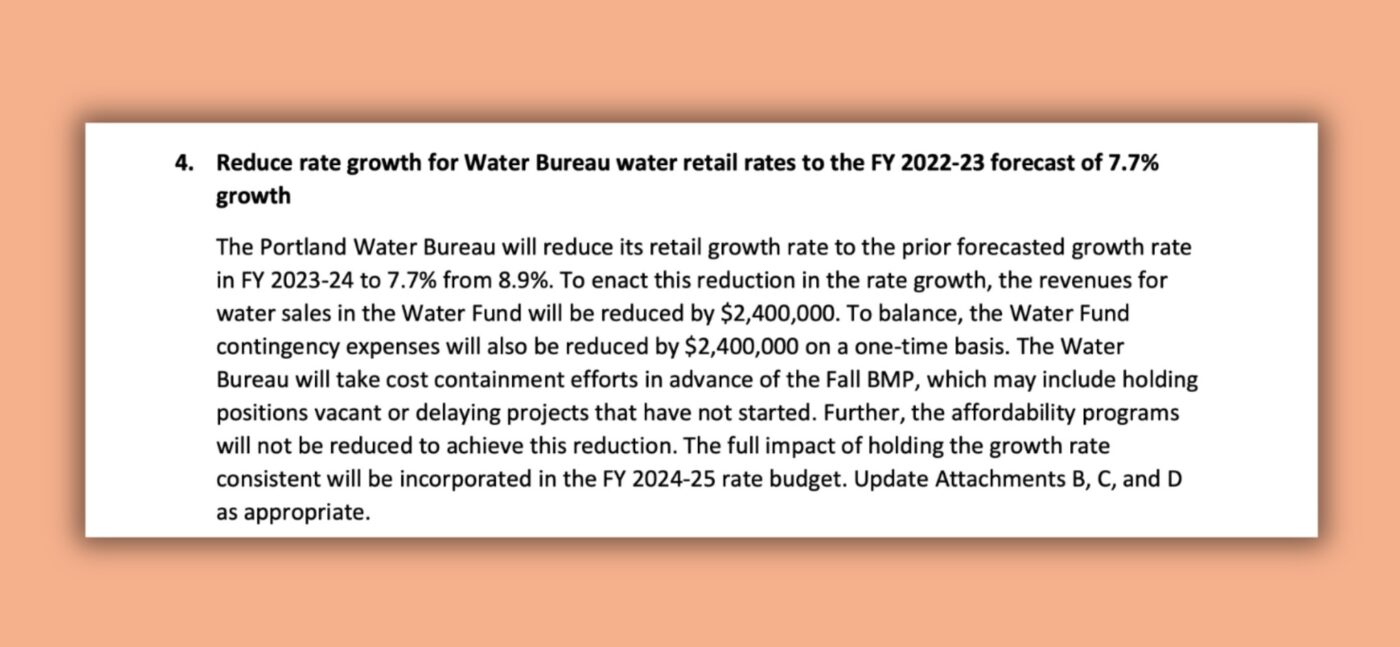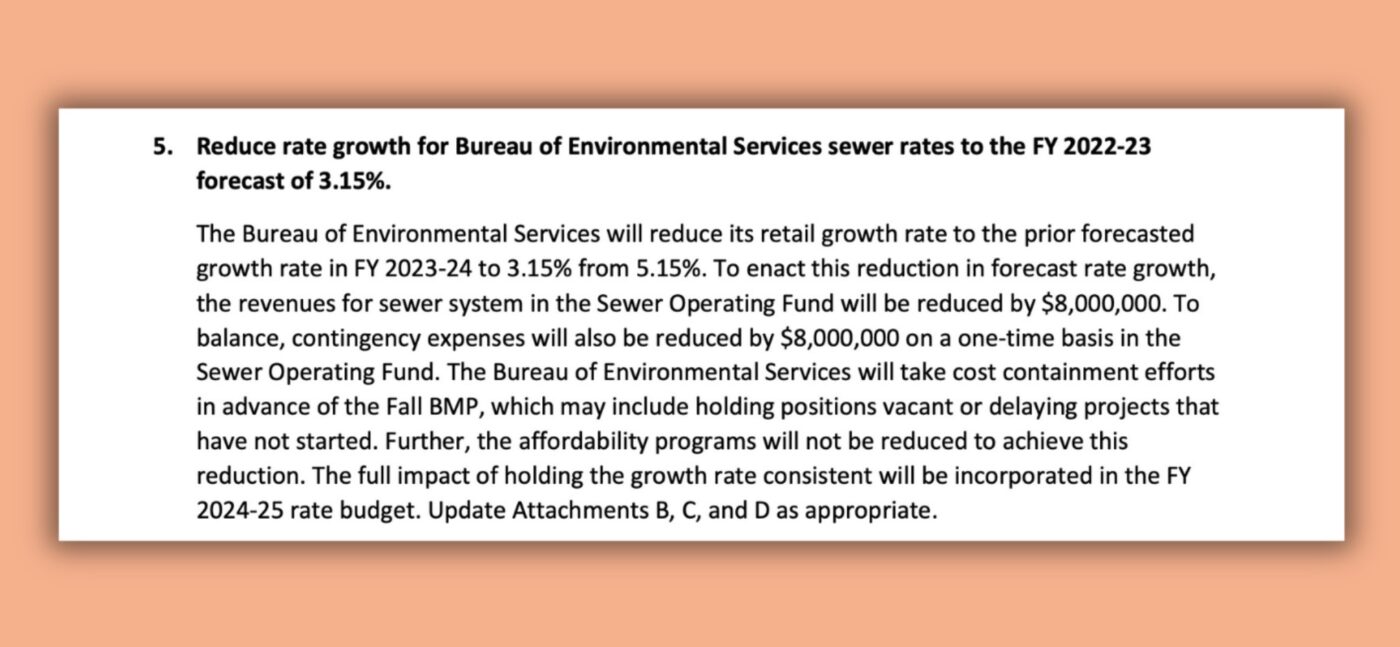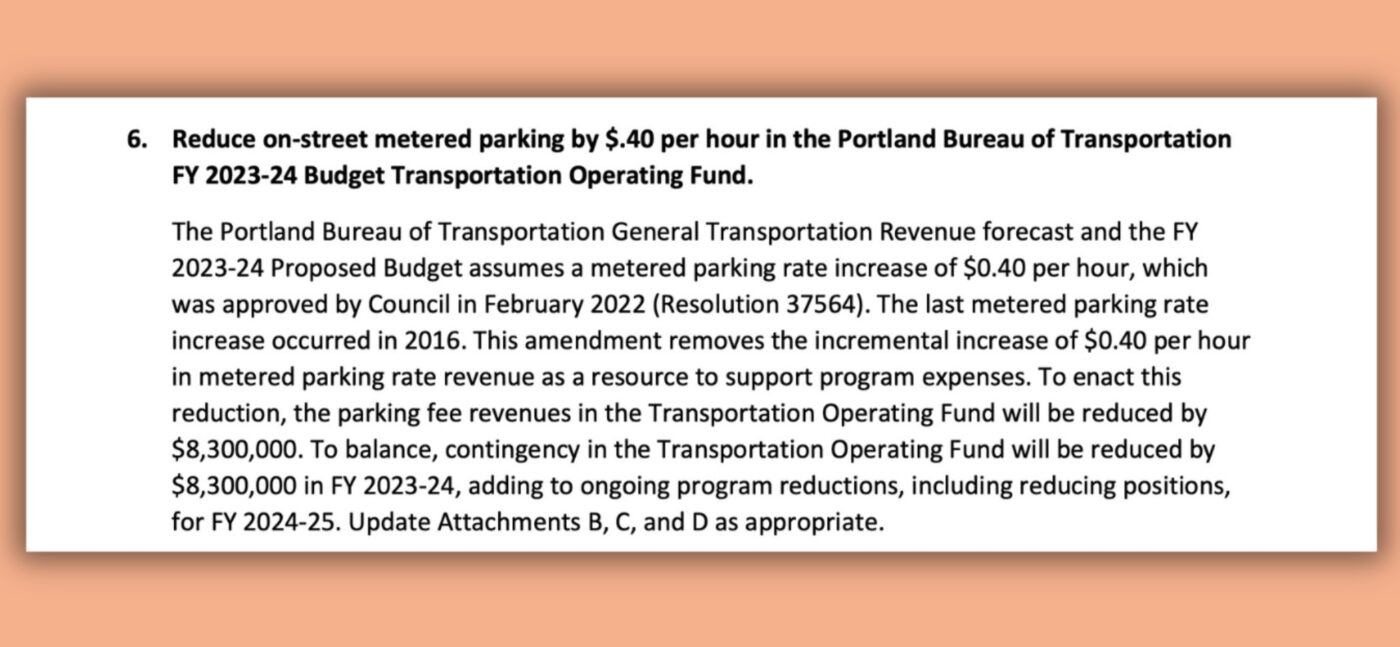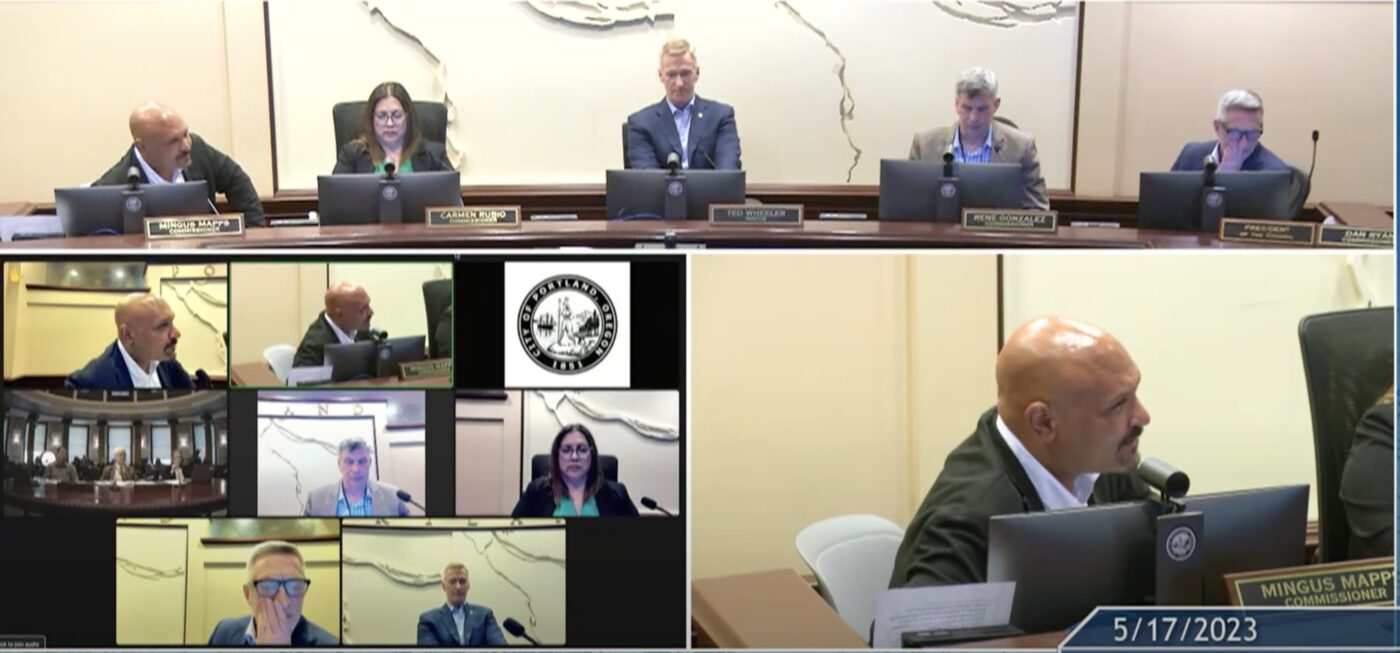At a Portland City Council meeting Wednesday, Mayor Ted Wheeler tried to freeze planned fee increases from three city infrastructure bureaus. It was all part of an eleventh-hour, anti-tax crusade from Wheeler that caught other city commissioners off-guard and made them scramble to justify parts of their budget they believed were already safe.
Wednesday’s meeting was the final step in the process to approve the City of Portland’s $7.1 billion budget, but it was the first time commissioners debated three amendments from Wheeler that sought to reduce planned fee increases from the Bureau of Environmental Services, Water Bureau, and Portland Bureau of Transportation that would total $18.7 million in revenue. At the meeting, Wheeler and the four other commissioners heard public testimony on the amendments and had heated exchanges about the impacts of the reductions.
“These increases are choking the life out of this community. People are picking up and they’re leaving.”
– Ted Wheeler, mayor
“It just doesn’t pass the smell test to say the reason why people are leaving the city is because of parking meter rates.”
– Mingus Mapps, commissioner
From Wheeler’s perspective, his moves are all about making people like Portland more. He’s worried that too many people are fleeing our city and he thinks the cumulative impact of the many fees and taxes people pay in this region (not just from City of Portland, but from Metro and Multnomah County) are a major reason why. “We want people to stay [in Portland],” Wheeler explained. “And I think people acknowledge that we are at an inflection point in our city. And studies now show that people are choosing not to stay here.” Even though Wheeler has been mayor for six years, he never once in the meeting acknowledged that perhaps there are other reasons people are leaving — like the fact that during his tenure Portland has not made tangible progress on our most pressing crises like homelessness, housing, drugs, guns, traffic safety, and so on.



At one point in the meeting Wheeler likened his attack on these planned fee increases as him taking, “bold action to lead.”
While Wheeler is right that no one likes paying more for things, some of his fellow commissioners — and almost every member of the public who showed up to testify against his plans — feel like this type of populist gesture is the wrong policy at the wrong time.
PBOT Commissioner Mingus Mapps was more animated and engaged at yesterday’s meeting than I’ve ever seen him since he came to office in 2021 — not surprising since he’s commissioner-in-charge of all three bureaus Wheeler wanted to take money from. Mapps arrived at City Hall Wednesday looking at over $18 million in reductions to budgets that had already been crafted. The magnitude of what Wheeler sought at the last minute was an extremely rare move and it was clear that this episode has created distance between he and Mapps.
“We can’t throw our umbrella away in a rainstorm and we can’t afford to throw away a reasonable mechanism to keep the lights on at PBOT… while this larger conversation takes place.”
– Indi Namkoong, Verde
“The [transportation] bureau is on life support, and we are pulling the plug today. I have not seen something like this in an urban setting. Ever. This is a truly remarkable moment,” Mapps said loudly into his microphone as he turned his head and looked at Wheeler. “It just doesn’t pass the smell test to say the reason why people are leaving the city is because of parking meter rates.”
Mapps had strong support from the public testimony.
Michael Andersen, a researcher at Sightline, said parking fees are an excellent tool to raise revenue and encourage outcomes that make Portland a better place to live. He said the best policy would be to simply enact the parking pricing policies Council already passed in 2021 when its Pricing Options for Equitable Mobility plan recommended dynamic parking meter rates where prices are set based on how busy a space is.
Kiel Johnson, a former chair of advocacy group BikeLoud PDX, said, “These cuts will mean more Portlanders are putting their lives on the line each time they go out and use our streets by bike and to many others will decide it’s not worth the risk… Do not defund our roads.”
Chris Smith, a veteran civic activist, budget advisor to two former Portland mayors, and former member of PBOT’s Budget Advisory Committee put it bluntly: “Absent this overdue increase in parking fees, PBOT is basically going out of business. I would urge you not to allow that to happen. [The parking rate increases are] overdue and it’s a good policy for the city.”
Portlander Will Hollingsworth said Wheeler’s amendment, “Reeks of craven politicking and it endangers the ability of the city to carry out its bedrock functions.”
Indi Namkoong, transportation justice coordinator with Verde, said, “We can’t throw our umbrella away in a rainstorm and we can’t afford to throw away a reasonable mechanism to keep the lights on at PBOT… while this larger conversation takes place.”
After the testimony, Wheeler refuted some of what he heard. “This is not a cut. This is holding the line on proposed increases. Others had suggested that without this fee increase PBOT is broken. Yes, it would require some tough choices and trade-offs, but it’s hardly them being broke and it’s certainly not as a result of cuts. People said, ‘Well this this will bring to an end critical projects and making sure our city meets our climate action goals, etc. etc.’ It does not have to. The cuts do not have to come out of those critical projects.”
To reinforce his point, Wheeler peppered staff with questions about just how much of an impact the $8.3 million reduction (which is what PBOT would have to make without the 40-cent meter increase) would have on PBOT’s budget. The reduction would come out of PBOT’s General Transportation Revenue, a vital pot made up of parking fees and gas taxes that funds many popular programs. A PBOT budget staffer said when the $8.3 million is combined with large and consequential cuts PBOT already has to make it would amount to a 35-40% reduction to those programs.
Wheeler feels there are “substantial other resources” in PBOT’s capital budget that would not be impacted. But what Wheeler didn’t acknowledge is that PBOT can’t spend capital money without the staff to do the engineering, communications, planning, and construction of those projects. To see Wheeler clearly disagree with PBOT staff, the PBOT commissioner, and advocates who shared expert testimony, really made it clear how out-of-step his views about PBOT have become.
Despite a City of Portland survey that showed higher meter rates have almost no impact on peoples’ decisions to drive and park downtown, Wheeler was steadfast in his belief that it does.
“We are begging people to come to downtown Portland and see that we have improved the situation [his belief is that we need to earn back people’s trust that the city is getting better, before we charge them more]. And studies show that when people come to downtown Portland, they are twice as likely to have a favorable impression of the city than prior to coming to downtown Portland. So it’s really important at this moment in our history, for us not to send mixed signals to say ‘Come to downtown Portland! And oh, by the way, we’re increasing the parking meter rates 40-cents per hour*.”
(*Note that when this 40-cent increase came to council in 2022, Wheeler voted in favor of it.)
“I don’t want people to think I’ve lost my fiscal bearings,” Wheeler continued. “I most certainly have not. But I also see a bigger purpose here. In terms of what we need to do over the course of the next year to rebuild confidence in the city.”
The central tension between Wheeler and Mapps comes to down to how they foresee the impact of these fees on peoples’ experience of our city. Wheeler thinks folks will be so happy to save 80-cents while shopping for two hours downtown and will have such a great time doing so, that it will help spark the revitalization he so desperately wants (and needs, politically). Mapps thinks the additional budget reductions Wheeler is asking of his bureaus will result directly in service cuts that will make their experience even worse.
Here’s how Wheeler puts it:
“… These increases are choking the life out of this community. People are picking up and they’re leaving our community. We have to turn that [around] by encouraging people to see the work we’re doing and believe in the work we’re doing and believe the value they’re getting for their very high tax, fee, and utility rate increases in the city are worth it to them. I believe the programs and the policies that this council has put into place are showing good early results and in a year from now the public will see the outcomes of those results. But in the near term, I’m asking us to hold the line and do everything we can to encourage people to stay here, to come here, to invest here, to bring their employees back to the City of Portland.”
And here’s how Mapps put it:
“What we are doing this afternoon is undermining the quality of services that this city council provides to the people of Portland. We are not advancing our position here. We are shooting ourselves and the people of Portland in the feet… I think it’s completely reasonable for this council to look at lowering the rates that we charge in taxes, and we should bring a critical eye to doing that. At the same time, one of our things that we’re also trying to manage is the quality of services we provide. We can save Portlanders 80-cents per parking trip, which is probably not going to be the thing that keeps you staying in Portland if you’re thinking about moving out, but by foregoing that 80-cents increase in parking meter revenues, we will actually see dramatic and profound and unavoidable reductions in services to the people of Portland. I am deeply skeptical that this is the reason why Portlanders are going to leave the city. However, I do believe one of the reason why Portlanders will be leaving the city in the coming years is our crumbling infrastructure.”
Mapps and Wheeler weren’t the only voices that mattered on Wednesday. Commissioner Rene Gonzalez sided strongly with Mapps and opposed the mayor’s amendment.
“40-cents per hour to park downtown, you know, that’s less than the price difference between a grande and venti at Starbucks… Is that really going to impact behaviors? We concluded maybe not,” Gonzalez said. But Gonzalez did acknowledge Wheeler’s point about the public perception created by the cumulative tax burden. Even so, Gonzalez objected to the lack of process and time he and his staff had to react to Wheeler’s proposals. He also said, “The disproportionate impact on infrastructure is a concern to me. Infrastructure in the city has long been under-supported and under-invested in, and that’s where we’re placing the burdens today.”
In the end, Wheeler’s amendment to roll back the 40-cent parking rate increase failed 1-4. He was the only person who voted for it.
Mapps proposed an amendment to increase the rate by just 20-cents. That passed 4-1 with Wheeler being the sole “no” vote.
The other two fee reductions — for the Water Bureau and for BES — passed by a 3-2 margin with Gonzalez joining Mapps in opposition and commissioners Ryan and Rubio going voting in support with Wheeler.
The one thing everyone agreed on was an amendment from Commissioner Carmen Rubio to freeze all system development charge rates for one year, a move expected to make it cheaper to build new housing.
The Mayor’s proposed budget passed by a vote of 4-1, with Mapps being the sole “no” vote. Mapps said asking Portlanders to pay a few dollars in monthly fees to maintain basic services like sewage processing and street maintenance is worth the money it will save the City in the long run by having functioning public works bureaus.
“My ‘no’ vote is a red flag and a warning to Portlanders. This budget contains some terrible decisions around funding infrastructure, in order to literally save pennies.”
– Mingus Mapps
“My ‘no’ vote is a red flag and a warning to Portlanders. This budget contains some remarkably bad choices, especially around infrastructure bureaus. This is a very sad day for the City of Portland and for people who sit in these chairs in the years to come. We pulled the plug on that life support. This budget contains some terrible decisions around funding infrastructure, in order to literally save pennies.”
Even though Mapps was able to save half the parking fee increase, it still means he lost an additional (and unexpected as of a few days ago) $4.1 million from his budget. He said it will be a challenge going forward to maintain programs like Safe Routes to School and Sunday Parkways. One bit of good news from the meeting was a comment from Commissioner Ryan that made it clear the Portland Parks & Recreation Bureau will likely step in and help with Sunday Parkways funding.
But that will be a tiny bright spot in what is likely to be an upcoming era of unprecedented cuts at PBOT, an agency that has a far more complicated and strained budget than any other. After a decade of cuts and reductions in service and staff, it was really striking to watch a mayor intentionally make it even worse. And with his high-profile skepticism about the need for parking rate increases in general, Wheeler has fed into a narrative PBOT has fought against for a long time and has likely made it more difficult to price transportation fairly in the future.
“If we continue down this route, we are talking about layoffs of more than 100 people, maybe many hundreds of people, in the next couple of years,” Mapps said, as he tried to underscore the severity of the impacts. “I’m not against belt tightening and reimagining how we do our work, but if one of the expectations of the people in Portland is that they pay their taxes and get good services, I can guarantee you, this is going to undermine our ability to provide people with transportation services. We are accelerating the deterioration of PBOT.”
The budget office will now incorporate these changes and Council will make the final vote to adopt the budget in mid-June.



